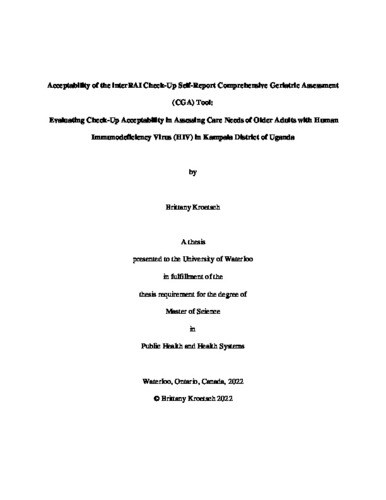| dc.description.abstract | Background:
The Ugandan healthcare system is ill-equipped to manage the emerging medical and social needs of its aging population. With the high burden of human immunodeficiency virus (HIV), food insecurity, and the erosion of support systems, older adults are limited in their ability to maintain physical and emotional health and well-being. High levels of impairment in activities of daily living, cognition, and frailty associated with HIV coupled with increased multimorbidity for aging Ugandans calls for the revision of healthcare policies and evidence-informed practice.
Objectives:
This thesis aimed to estimate the association between HIV status and (i) activities of daily living, (ii) cognitive function, (iii) health stability, and (iv) clinical frailty in older persons living in Kampala, Uganda using the interRAI Check-Up self-report assessment instrument. Additionally, this thesis aimed to (v) evaluate assessment acceptability to inform healthcare system planning and care practices.
Methods:
A mixed methods design was employed. In Phase One, HIV-positive and negative older adults aged ≥60 years were assessed using the interRAI Check-Up self-report in the Nakawa division of Kampala. Patient characteristics were summarized with descriptive statistics, and a logistic regression analysis was used to identify differences in activities of daily living, cognitive function, health stability, and frailty of older persons in the study. In Phase Two, key informant interviews with service providers at the Reach Out Mbuya Community Health Initiative were held to characterize the acceptability of the Check-Up in the Ugandan setting and to explore perceptions of its use.
Results:
In Phase One, 130 Check-Up assessments were obtained for older persons in the community.
HIV status was found to not be statistically significantly associated with the outcomes of interest and age was found to be positively associated with outcome scores for activities of daily living, cognitive performance, and frailty. However, age was not found to be associated with health stability. In Phase Two, 12 interviews were held with service providers at the Reach Out Mbuya Community Health Initiative. The Check-Up was found to be acceptable for use in the Ugandan setting, with minor gaps identified for coverage of economic stability, food security, living arrangement, and the physical environment. Further, challenges with languages offered, the technology required, and length of time to complete was discussed.
Discussion:
Findings of age-related associations for activities of daily living, cognitive performance, and frailty were conclusive with expectations for the trajectory of health throughout the aging process. Similarities across HIV-positive and negative participants are attributed to participant age, low study sample size, viral suppression, and healthcare service utilization. For Check-Up use in the Ugandan setting, several recommendations are made to address identified gaps including question modifications, further translations, provision of additional tablets, and granted permissions to RAIsoft. Next, capacity training for Check-Up use by service providers is introduced, including the need for sensitization of gender differences and appropriate structuring of assessors in the field. Lastly, a theoretical framework assessment revealed barriers in the ability of the Theoretical Framework of Acceptability to identify key gender and socio-cultural differences in intervention recipients and deliverers.
Implications:
This thesis provided important information for describing the needs of aging Ugandans and insight into how a standardized instrument can help to support the development of a geriatric-friendly healthcare system across the nation. This was an important step in establishing an interRAI community of practice in East Africa. | en |

